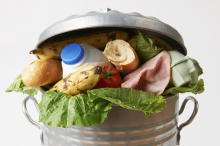
France has become the first country in the world to ban supermarkets from throwing away unsold food under a new law that requires them instead to give unspoiled food to charities or food banks. The French senate unanimously approved the bill on Wednesday, following a lower house vote last year. The legislation stipulates that supermarkets measuring 400 square metres or more are no longer allowed to destroy any unsold, but still edible products, including products which would be thrown away because they are approaching their best-before dates. Now these supermarkets will have to sign donation contracts with charities or face penalties, including fines of up to €75,000 (£53,000) or two years’ imprisonment. Food banks and campaigners welcomed the law, which was propoased last year by the former food minister Guillaume Garot. According to Jacques Bailet, head of Banques Alimentaires, a network of French food banks, the law is “positive and very important symbolically”, The Guardian reported. Bailet said it would greatly increase an already emerging trend for supermarkets to donate to food banks. “Most importantly, because supermarkets will be obliged to sign a donation deal with charities, we’ll be able to increase the quality and diversity of food we get and distribute. In terms of nutritional balance, we currently have a deficit of meat and a lack of fruit and vegetables. This will hopefully allow us to push for those products,” he told The Guardian. The French Ministry of Ecology, Sustainable Development and Energy estimates food waste to amount to 7.1 million tonnes. Wasted food costs the average French household €400 a year, and the country up to €20 billion. Campaigners now hope to persuade the EU to adopt similar legislation in all member states. A report published last year showed that in the UK, households threw away 7 million tonnes of food in 2012, enough to fill London’s Wembley stadium nine times over. Avoidable household food waste in the UK is associated with 17m tonnes of CO2 emissions annually. (ab)
